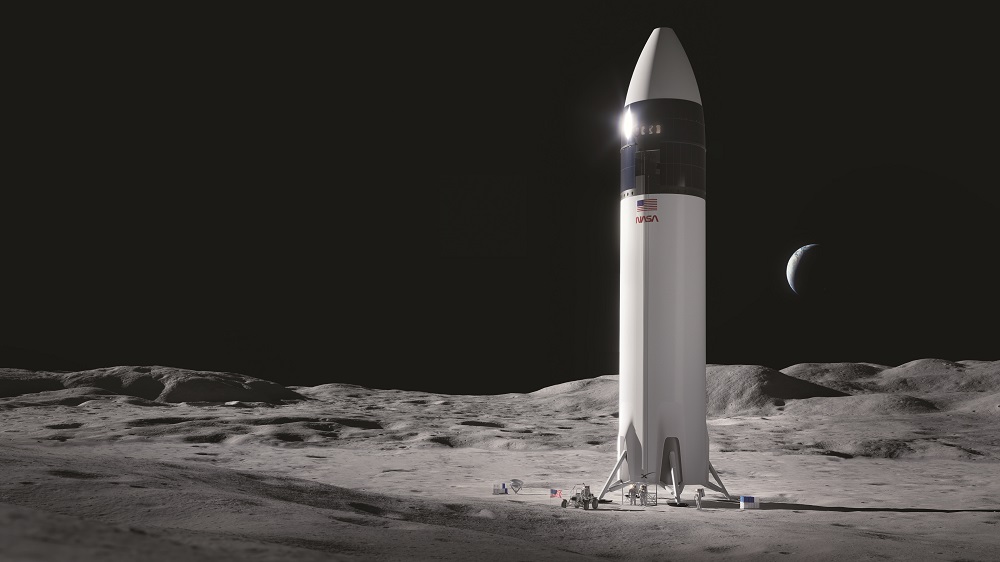WASHINGTON — Blue Origin is seeking to overturn NASA’s award of a lunar lander contract to SpaceX by arguing that SpaceX’s proposal failed to meet requirements for reviews that made it “unawardable.”
The U.S. Court of Federal Claims released Sept. 22 a significantly redacted version of Blue Origin’s complaint filed with the court Aug. 13. The complaint is effectively an appeal of the company’s protest of the Human Landing System (HLS) award to SpaceX that the Government Accountability Office rejected July 30.
The core of Blue Origin’s argument is that NASA ignored a requirement that bidders include a flight readiness review (FRR) before the launch of each element of the lander systems. Blue Origin alleges that SpaceX did not include FRRs before each “tanker” Starship launch, carrying propellant that would fuel the lander Starship. NASA, in later negotiations with SpaceX, did require an FRR before each type of Starship launch, but that also failed to meet the requirements of the solicitation, according to Blue Origin.
Failure to meet that requirement was a deficiency that Blue Origin argues should have disqualified SpaceX from an HLS award. “The Agency’s decision to select SpaceX’s deficient proposal for initial, conditional award, was irrational and in direct violation of the Solicitation’s ground rules stating ‘Offerors are hereby notified that proposals evaluated as having one or more deficiencies are unawardable,’” it stated in the complaint (emphasis in original.)
“We stand by our position that NASA selected a proposal that was not in compliance with the solicitation. There’s serious safety issues around that, and that waiver of material requirements prejudiced us and Dynetics,” Megan Mitchell, vice president of government relations at Blue Origin, said in an interview.
The GAO, in the public version of its decision on the Blue Origin and Dynetics bid protests released Aug. 10, agreed that NASA erred in not requiring an FRR before every launch of a lander element. However, it did not sustain the protests because it found no evidence that the companies “could or would have changed their proposals to substantially increase their likelihood of receiving the award had they known of the waiver of the FRR requirement.”
Blue Origin disagreed. “Had Blue Origin known the Agency would waive the FRR requirements and other requirements that greatly impact schedule and risk, Blue Origin would have engineered and proposed an entirely different architecture with corresponding differences in technical, management, and price ratings,” it claims. It does not elaborate on what architecture would have been, although the passage that follows in the document is redacted.
The complaint also took issue with the negotiations NASA undertook with SpaceX after it selected it, which included addressing the FRR issue. The agency considered that a “post-selection negotiation” but Blue Origin argues those should be considered “discussions” under federal acquisition law, which would then have required NASA to hold similar discussions with the other bidders, allowing them to also revise their proposals.
“Had the Agency held discussions with Blue Origin and revealed its funding limitations to Blue Origin, as it did with SpaceX, Blue Origin would have lowered it price to meet those funding limitations,” the company states in the complaint. “Blue Origin also would have enhanced its technical and management proposal, and modified its payment schedule to fix purported advanced payments.”
SpaceX did not respond to a request for comment on the issues raised in the complaint, but in a tweet SpaceX Chief Executive Elon Musk rejected the claims about FRRs. “We always do flight readiness reviews! This argument makes no sense.”
Many of the details in the complaint are redacted. In one case, Blue Origin appears to suggest another deficiency in SpaceX’s proposal. “In addition to SpaceX’s failure to meet Solicitation requirements for FRRs, SpaceX also failed” but most of the rest of the paragraph that follows is redacted until the final sentence. “NASA completely overlooked this error and did not assess SpaceX any weaknesses for failure to meet this requirement.”
The redaction process was a source of frustration for Blue Origin, which had hoped to get a version of its complaint released as soon as late August. “The other parties to the case are redacting significant portions of our filing,” Mitchell said in an interview before the release of the redacted version. The company’s lawyers were working with the court “in making sure the documents are not over-redacted.”
Blue Origin’s suit suspended work on NASA’s award to SpaceX through the end of October, part of an agreement among the parties of the suit for an expedited review of the case. Blue Origin asked the court in its complaint to block further work on SpaceX’s award, direct NASA to open discussions with all the bidders and making a new selection, and pay Blue Origin’s legal fees.
In addition to the suit, Mitchell said Blue Origin is continuing to lobby Congress to provide additional funding so that NASA can make a second HLS award. That funding was not included in either the standard annual appropriations bill in the House or the House’s version of a $3.5 trillion budget reconciliation package, but she said the company was hopeful Senate versions of those bills will offer additional HLS funding. “We’ve got a lot of different irons in the fire.”
NASA Administrator Bill Nelson referred to the case when asked in a Sept. 21 call with reporters about the ability to meet the goal of returning humans to the moon by 2024 on the Artemis 3 mission. “If you have a coin, you can flip it as to what’s going to happen in the legal wrangling that’s going on right now,” he said. “What is the federal judge going to decide? When is he going to decide? What are the further legal possibilities about that?”
“Once we know better about things like that, then we can answer on Artemis 3.”
